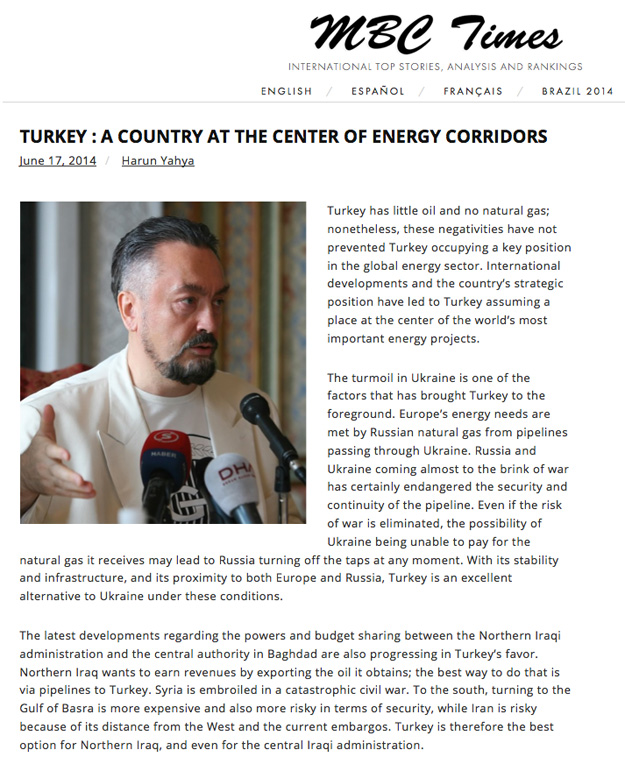

Turkey has little oil and no natural gas; nonetheless, these negativities have not prevented Turkey occupying a key position in the global energy sector. International developments and the country’s strategic position have led to Turkey assuming a place at the center of the world’s most important energy projects.
The turmoil in Ukraine is one of the factors that has brought Turkey to the foreground. Europe’s energy needs are met by Russian natural gas from pipelines passing through Ukraine. Russia and Ukraine coming almost to the brink of war has certainly endangered the security and continuity of the pipeline. Even if the risk of war is eliminated, the possibility of Ukraine being unable to pay for the natural gas it receives may lead to Russia turning off the taps at any moment. With its stability and infrastructure, and its proximity to both Europe and Russia, Turkey is an excellent alternative to Ukraine under these conditions.
The latest developments regarding the powers and budget sharing between the Northern Iraqi administration and the central authority in Baghdad are also progressing in Turkey’s favor. Northern Iraq wants to earn revenues by exporting the oil it obtains; the best way to do that is via pipelines to Turkey. Syria is embroiled in a catastrophic civil war. To the south, turning to the Gulf of Basra is more expensive and also more risky in terms of security, while Iran is risky because of its distance from the West and the current embargos. Turkey is therefore the best option for Northern Iraq, and even for the central Iraqi administration.
Another project that has raised Turkey’s profile concerns Cyprus. The south of the island has rich natural gas deposits in the 12th Parcel. If these can be extracted and marketed, the Greek Cypriots will easily be able to escape the current crisis. However, the transportation of that natural gas is a major problem: The gas could be carried by a pipeline to Crete and from there through Greece to Europe but that project would be expensive, and it is economically impossible for the Greek Cypriots to realize it. The most rational and best possible route is for natural gas to be carried to Turkey via a pipeline in the eastern Mediterranean, and from there to Europe.
There is another natural gas bed that makes a pipeline stretching to Turkey even more preferable: the Leviathan Parcel in the exclusive economic zone of Israel. Israel could sell its natural gas by tanker, without a pipeline, by liquefying it. Yet ensuring the safety of tankers carrying liquefied gas could cost Israel dearly because Hezbollah in Lebanon believes that Israel has ‘stolen’ Lebanon’s natural gas. The chances of an attack on tankers setting out from Israel are very high.
According to Captain Ilan Lavi, head of the Israeli Navy's planning division, Israel would need to invest $700 million in its navy to make the tanker option a reality; it would also have to spend an additional $100 million every year. That being the case, the most economical option for Southern Cyprus and Israel is a pipeline from Cyprus to Turkey. It is estimated that this pipeline would reduce costs by 25%. The only condition for the project to become a reality is achieving comprehensive peace in Cyprus.
Investment agreements for the Trans-Anatolian Natural Gas Pipeline Project (TANAP) for natural gas brought out of the Shah Deniz-2 field in Azerbaijan and the Trans-adriatic Pipeline (TAP) were signed at a ceremony late in 2013 . The construction process for the world’s greatest energy project, with a cost of $35 billion, has thus begun.
In addition to these developments, the existing Baku-Tbilisi Ceyhan (BTC), South Caucasus (SCP), Kirkuk-Yumurtalik and Blue Stream pipelines in Turkey are also of great strategic importance.
How will all these projects affect Turkey and the region? First and foremost, TAP and TANAP will be instrumental in regional countries achieving the security and stability needed for the other projects. As with the example of Ukraine, the countries through which the pipelines will pass need to live in peace much more than before; the Greek Cypriots will therefore have to work to resolve the disagreements between itself and Israel and Turkey.
Another dimension of these projects is that they will increase the importance and power of Turkey in international relations. A Turkey that maintains stability in the region, strengthens democracy and is close to the West will have a powerful impact on the Middle East.
Although they seem to be the reason for various conflicts now, pipelines running through Turkey may soon represent an important opportunity to bring peace and security to the Middle East.
Adnan Oktar's piece on MBC Times & The Bosnia Times:
http://www.mbctimes.com/english/turkey-a-country-at-the-center-of-energy-corridors


